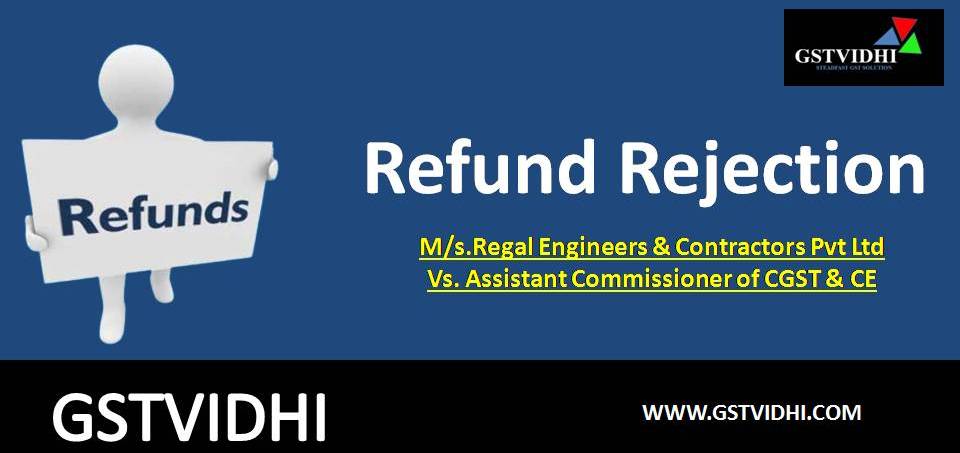
High Court Mandates CGST Authority
to Process Refund Application, Disregarding Limitation Due to Delayed Deficiency
Memo
By Yogesh Verma (CS/ LLB) / 2 min. read / GST Case Law
Case Title: M/s.Regal Engineers & Contractors
Pvt Ltd Vs. Assistant Commissioner of CGST & CE
- Party
Name: M/s. Regal Engineers &
Contractors Pvt Ltd.
- Case
No.: W.P. No. 29256 of 2024
- Court: High Court of Judicature at Madras
- Date
of Order: October 14, 2024
- Judge: Hon'ble Mr. Justice Krishnan Ramasamy
2. Summary of the Case
This case involves a petition filed by M/s. Regal Engineers
& Contractors Pvt Ltd. seeking a writ of mandamus, directing the Assistant
Commissioner of CGST & CE to process their refund application from 2018.
The petitioner argued that the refund should be granted along with interest,
despite alleged procedural delays and non-receipt of a deficiency memo from the
tax authority.
3. Facts of the Case
- The
petitioner is a civil contractor registered under GST, who supplied goods
to M/s. Vishay Precision Transducers India Pvt Ltd., a Special Economic
Zone (SEZ) unit, in October 2017. This transaction, valued at Rs.
27,50,408/-, included an IGST payment of Rs. 4,95,073/-.
- Under
Section 16 of the IGST Act, supplies made to an SEZ unit are considered
zero-rated. Consequently, the petitioner filed for a refund of the IGST
paid, submitting their application on February 22, 2018, through Form
RFD-01.
- After
an initial wait with no response, the petitioner sent a follow-up letter
on March 29, 2019, and submitted the required supporting documents.
However, the respondent allegedly issued a deficiency memo in April 2019,
which the petitioner claims never to have received.
- Upon
re-approaching the tax authority in 2023, the petitioner was informed that
their refund application had lapsed due to the unaddressed deficiency memo
from 2019.
4. Submissions by the Parties
- Petitioner: Argued that their refund claim was filed within the
stipulated two-year period. The petitioner stated that the deficiency memo
was not received in 2019 and that they only became aware of it in 2023.
The petitioner requested the court to instruct the tax authority to
process the refund application without considering the limitation period.
- Respondent: Argued that the refund application was not processed
due to the petitioner’s failure to rectify deficiencies highlighted in the
2019 memo. Consequently, the application had expired due to the passage of
time.
5. Findings and Judgment of the
Court
- The
court acknowledged that the petitioner’s refund application was filed on
time in 2018 and that the respondent issued the deficiency memo only in
April 2019—over a year later. Since the petitioner claimed not to have
received this memo and re-applied within the time limit, the court
concluded that the respondent’s delay contributed to the non-processing of
the application.
- The
court directed the Assistant Commissioner of CGST & CE to process the
petitioner’s refund application, without considering the time limit as a
restrictive factor, and ordered the authority to complete this process
within four weeks from the order date, after offering the petitioner a
fair hearing.
6. Conclusion
The High Court ordered the tax authority to process M/s.
Regal Engineers & Contractors Pvt Ltd.'s refund application, setting aside
the limitation argument due to procedural delays on the respondent's part. This
case reinforces the principle that procedural fairness should guide the
resolution of taxpayer claims, especially when administrative inefficiencies
impact compliance.
Find the Attachment (Press on Click Here )
Click here